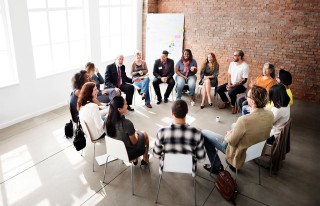News
Welcome to our news section. Our latest news will appear here.
Spotlight on conflict resolution
Spotlight on: Mediation and conflict workshop
I was recently speaking with someone who is about to join us on our mediation training course, and they reflected that – having read the course materials – they realised that mediators don’t make suggestions. This reminded me how little is known about mediation and how at times even when people think they know what mediation is, they can be misinformed.
Community mediation in Scotland began in 1995, with the first service launched in Edinburgh. For over 30 years mediation has been used across Scotland to help neighbours sort out conflicts and to help them develop their own skills in dealing with conflicts more constructively. Our own training has been around for over 25 years now, so why the lack of knowledge and understanding?
New training launched for 2026
New training calendar launched for 2026
We are pleased to announce the launch of our training calendar. For 2026 we have some exciting new workshops to offer, plus our popular and well-respected courses in mediation, conflict resolution and restorative skills. Below are a few highlights.
Mediation ‘taster’ workshop (1.25 hours)
Heard of mediation but not sure what it means? This short workshop explores some of the principles of mediation and outlines the process.
Mediation practice workshops (half day)
For those who have passed our accredited Mediation Skills course, this workshop provides further opportunities for practising skills in a safe and fun environment.
Mediate 2024 Conference: A reflection

With just a week to go before Scottish Mediation’s conference in 2025, and with it being in the middle of the conference season, my thoughts turn back to last year’s mediation conference which was held at the V&A Museum in Dundee. Looking back at my notes and reflecting on the day, some of my thoughts echo something that I have written about in an earlier blog. These are that we are so focused on delivering and developing services, supporting clients and thinking of new ways to help the people that we support, that we rarely take the opportunity to look around at the wider landscape, let alone trumpet our successes from the rooftops.
In looking at the wider landscape and hearing from others in the field, I am reminded of how, at the 2024 conference, we heard from the President of the Mediation Institute of Ireland. The President talked about how mediation has grown over the years in Ireland. We learnt that in recent years mediation has become embedded in some key pieces of legislation. We heard how a key step-change was the Law Reform Commission Report on alternatives to dispute resolution in 2010, which helped begin to shift thinking and set out mediation as an inexpensive and relatively quick way to sort disputes. Since 2010 mediation has become a word that is heard more frequently in Ireland, in international as well as local conflicts. It has a proven track record, with – in one area of mediation - some 70% of cases successfully resolved.
Restorative Justice podcast out now
To celebrate #RJWeek2025 we are delighted to launch our latest podcast.
Listen to Ret. Sheriff David Mackie reflect on Scotland’s restorative justice journey. A long-time advocate of restorative practice, he shares his personal journey of discovering – and championing – the vital role restorative justice can play within the criminal justice process.
Listen here: https://open.spotify.com/episode/60HyPdM2gtp2Xh7WqQvMhK
If you would like to learn more or take part in restorative justice process, contact infoscmc@sacro.org.uk
#RJWeek2025
Autumn Newsletter now out

Our Autumn 2025 newsletter is now out. Here you can read about our future training events and how we plan on celebrating International Restorative Justice Week 2025.
https://mailchi.mp/e77388644745/mediation-news-from-scmc-3253

